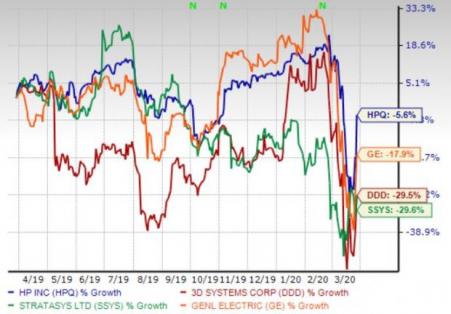
- All Instrument Types
- Indices
- Equities
- ETFs
- Funds
- Commodities
- Currencies
- Crypto
- Bonds
- Certificates
Please try another search

3D Printing Firms Join Fight Against Coronavirus-Led Disaster

As the Coronavirus pandemic continues to spread, the rising number of patients calls for better infrastructure and safety for the comparatively lesser number of healthcare workers. Hospitals are grappling with the rapid spread of the virus and shortage of protective gears for its staff.
Notably, the coronavirus outbreak has claimed 24,361 lives, while total number of infected persons is now 542,788, per the Johns Hopkins University data.
Amid such an environment, apart from charitable donations, healthcare providers are turning to 3D printing (also referred to as additive manufacturing) to produce gadgets and gears in an effort to mitigate the risks faced by doctors and nurses attending to coronavirus (COVID-19) infected patients.
New Doors Opening for 3D Manufacturing
While it is difficult to 3D print complex medical devices like respirators, additive manufacturing can help mitigate the cross-contamination risks with materials such as face shields, mask adjusters, hands-free door openers, hands-free sanitizer dispensers and others.
The rising demand for 3D-printed materials to combat the global pandemic is also setting the stage for wider use of additive manufacturing in the medical field in the post-coronavirus era.
The medical emergency is giving rise to more research and experimental productions with 3D printers. The importance of 3D-printed materials in the medical field is being realized on a larger scale. Rapid production of materials is making 3D-printed protection gears a necessity in these difficult times.
Bellwethers Lead the Way
Since the very beginning of the outbreak, health officials have issued warnings that places used by multiple people, such as door handles, soap and sanitizer dispensers, are the most germ-infested objects, especially in care homes and hospitals. These concerns can be easily addressed with the help of 3D-printed materials, which minimize the use of hands.
Moreover, small supplementary materials to complex devices, such as adjusters to enhance the comfort of face masks, and in more crucial cases, venturi valves that are used to change the oxygen and airflow in respiratory masks used by patients with breathing difficulties, can be mass-produced with additive manufacturing.
The shortages and spike in demand for protective gears are driving conventional manufacturers like HP, Inc. (NYSE:HPQ) , 3D Systems (NYSE:DDD) , General Electric (NYSE:GE) and Stratasys (NASDAQ:SSYS) to ramp up production.
One-Year Price Performance

Let’s delve deep to find out about the initiatives undertaken by these companies to limit the spread of coronavirus.
HP is focusing on enhancing its 3D printing business capabilities in the face of the coronavirus pandemic. Recently, this Zacks Rank #2 (Buy) company announced that it is building 3D-printed hands-free door openers, mask adjusters and face shields and has already supplied more than 1,000 of these to hospitals. You can see the complete list of today’s Zacks #1 Rank (Strong Buy) stocks here.
Stratasys is currently printing both re-usable and disposable face shields on numerous FDM 3D printers. This Zacks Rank #3 (Hold) company aims to deliver at least 5,000 shields to critical need locations over the next few days.
Moreover, GE Healthcare recently tied up with Ford Motor Company (NYSE:F) to jointly combat the coronavirus pandemic. More than 100,000 face masks are expected to be produced each week through this partnership. Besides, 3D-printed disposable respirators for healthcare workers will also be produced.
Notably, 3D Systems recently announced that it will produce ventilator valves, face shields and lung ultrasound simulators, leveraging its 3D-printing expertise.
Smaller Companies Join the Bandwagon
Not only big manufacturers but independent 3D printers are also stepping up to meet the need of the hour.
Italian 3D-printing startup — Isinnova — recently began printing venturi valves, which are being widely used.
Moreover, per Tech Crunch, 3D-printing company, Formlabs, is expected to be exempted by the U.S. Food and Drug Administration for its swab designed to be used in COVID-19 test kits. The company expects to produce 1,000 swabs daily, once exempted.
Final Note
Apart from the current surge in demand due to the pandemic, prospects of additive manufacturing owing to its uses in various other fields are also attractive.
Per Grand View Research, the global 3D printing market size is anticipated to witness a CAGR of more than 14% between 2020 and 2027. Moreover, per the 3D Printing Trends Report 2019, the 3D printing market is expected to double every three years, displaying immense growth potential for players in this market.
The Hottest Tech Mega-Trend of All
Last year, it generated $24 billion in global revenues. By 2020, it's predicted to blast through the roof to $77.6 billion. Famed investor Mark Cuban says it will produce ""the world's first trillionaires,"" but that should still leave plenty of money for regular investors who make the right trades early.
See Zacks' 3 Best Stocks to Play This Trend >>
HP Inc. (HPQ): Free Stock Analysis Report
Stratasys, Ltd. (SSYS): Free Stock Analysis Report
General Electric Company (GE): Free Stock Analysis Report
3D Systems Corporation (DDD): Free Stock Analysis Report
Original post
Related Articles

The markets have been sluggish this week as investors hope for a jolt later in the week when AI juggernaut NVIDIA Corporation (NASDAQ:NVDA) reports fourth quarter and year-end...

On Friday, a wave of selling pressure swept across the US equity markets, leaving a trail of losses. The S&P 500 closed down 1.7%, the DOW slid 1.69%, and the NASDAQ tumbled a...

Palantir remains highly valued with a 460x P/E ratio and a 42.5x P/B ratio, far above its peers. The stock's beta of 2.81 signals high volatility, meaning sharp moves in both...
Are you sure you want to block %USER_NAME%?
By doing so, you and %USER_NAME% will not be able to see any of each other's Investing.com's posts.
%USER_NAME% was successfully added to your Block List
Since you’ve just unblocked this person, you must wait 48 hours before renewing the block.
I feel that this comment is:
Thank You!
Your report has been sent to our moderators for review




Add a Comment
We encourage you to use comments to engage with other users, share your perspective and ask questions of authors and each other. However, in order to maintain the high level of discourse we’ve all come to value and expect, please keep the following criteria in mind:
Enrich the conversation, don’t trash it.
Stay focused and on track. Only post material that’s relevant to the topic being discussed.
Be respectful. Even negative opinions can be framed positively and diplomatically. Avoid profanity, slander or personal attacks directed at an author or another user. Racism, sexism and other forms of discrimination will not be tolerated.
Perpetrators of spam or abuse will be deleted from the site and prohibited from future registration at Investing.com’s discretion.